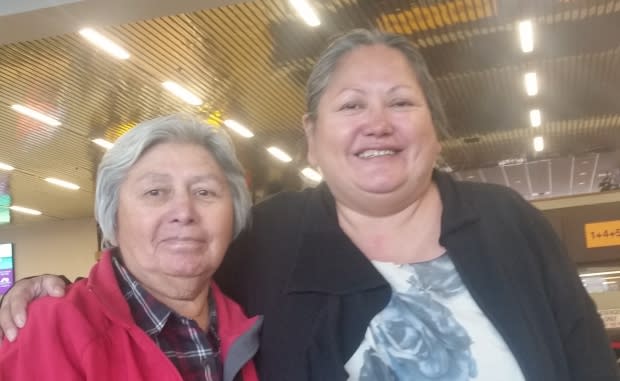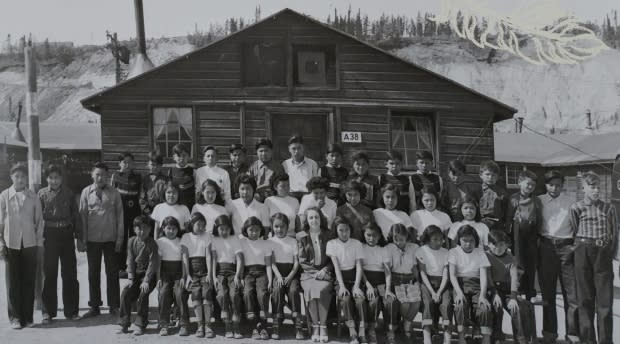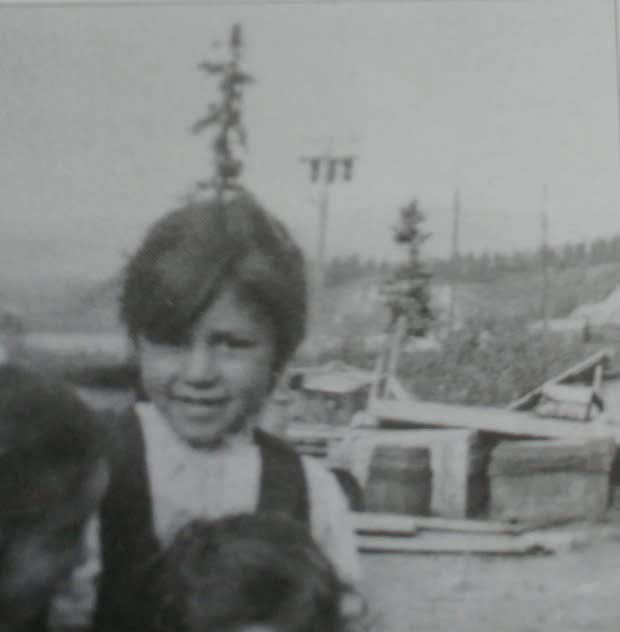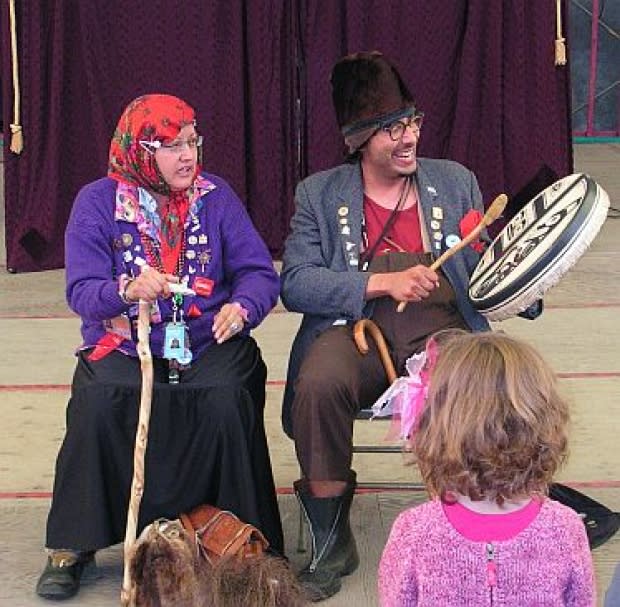There are thousands of intergenerational survivors' stories — this is mine
This story is part of CBC North's series Children of Survivors | Impact of residential schools. This week we're highlighting the stories of several children of residential school survivors and the effect intergenerational trauma has had on their lives.
My name is Sharon Shorty and I am from Whitehorse. I am the child of residential school survivors.
The impact of residential school is intergenerational, and I am in the first generation to feel the effects of this trauma. My parents, aunts and uncles, and one brother attended residential schools in the Yukon, British Columbia and Alberta.
My mother Winnie Peterson is a Tlingit woman. She lost access to stories, her language, traditional beliefs and practices like sewing because of residential school.
Black and white pictures of my mother, late father, and her sisters at Yukon's Baptist Mission School in a book called Finding Our Faces, which acknowledges the survivors and what they endured: separation from family, bullying from other students, and loss of their culture.

In the book, she shares: "I wasn't quite six years old and, 64 years later, I am finally starting to deal with the issues."
I see this as the start of my story.
When I was in Grade 4 she left me with her sisters (my aunties) to flee to B.C. from an abusive relationship with my father. It was a traditional practice to leave me with my aunties, and I thank God she did it and for their support.
Before that, life at home was confusing.
I felt alone and lonesome growing up. I didn't understand where my dad's anger and hurtful words toward me came from.
My dad, the late Joe Shorty, was angry a lot and it was scary.
My mom was sad a lot. I felt alone and lonesome growing up. I didn't understand where my dad's anger and hurtful words toward me came from.
I also liked to go to church as a child and my dad would mock me for it. There was very little affection in the home. I did not know that since my parents didn't grow up with their families, they didn't learn parenting skills.
Years later as a new mother, I struggled with being affectionate to my son. I felt that part of the syndrome can be beaten though, and I learned to show my feelings. But it takes a lot of strength.
Healing through humour
As a storyteller, playwright and comic, I have turned to humour for 20 years.

During the Truth and Reconciliation Commission hearings, Chief Justice Murray Sinclair asked me and my performing partner to do our comedy act, Gramma Susie and Charlie, at several national events.
He said survivors would need laughter during the difficult hearings.
In the routine, we dress as elders and share stories of life. I had discovered that recalling the wisdom and humour of our grandparents and aunties could be a way to reconnect the older and younger generations. It's also a restorative and healing experience.
It was a privilege to be able to connect with survivors and listen to their stories. I was even more honoured to make people laugh, so they could heal a little more.
It was challenging to hear about the abuses in public, with so many people listening. I also went into a witnessing room and recounted my experiences as a young child, growing up among people who attended residential school.
It was a privilege to be able to connect with survivors and listen to their stories.
I witnessed the trauma of the generation before me.
During the events, there was a birthday party for survivors to acknowledge that their birthdays had never been recognized in residential school.
It was wonderful to see them childlike, enjoying the balloons, birthday cards and cupcakes. I took a cupcake for my late father.
It made me realize why we didn't have many birthday parties as kids, and why it was so important for me to have parties for my son.
'Reconciliation is a journey'

When something new comes up in my life, I realize the impact intergenerational trauma has on me — my initial reaction is always fear and anxiety.
For example, I recently had to get a CPAP machine to treat sleep apnea. Dealing with the specialist, who is an authority figure, adds to my stress.
When I feel sad in the fall — back-to-school time — it's not just coming from me and my family but from the past seven generations and what they have gone through.
It has been proven that these memories get passed through our DNA and I totally believe that it can.
Sometimes life can become too much to handle, it overwhelms me a great deal and I feel lost. The reconciliation that I need to do is with the survivors in my life and my son. This is an ongoing process through private talks, sharing my story, and prayer.
When I was dating my husband, he invited me to church. It took me a long time to attend. It helped that it was the United Church and knowing it was one of the first churches to apologize to residential school survivors in 1986 — an act of reconciliation helped make me feel safe to go.
When I was at TRC events over the years, I noticed there were more intergenerational survivors than residential school survivors.
I would like to see more opportunities for us. I hope there are conferences, gatherings, and healing events for us to share and understand the impact it has had on the children.

I also hope other Canadians realize that reconciliation is for everyone, and that reconciliation is a journey.
When I say I get overwhelmed, it is because I often wonder if I'll ever be healed from the intergenerational trauma of Indian residential school syndrome.
For my son, I hope it will be easier than what I've gone through.
He needs the second generation to be there to support and encourage him, and to stop the cycle of trauma, so healing can gradually grow over the generations.
To the survivors before me who have had the courage to share what they went through at residential school — I am really happy for that.
I've seen it make a difference in my life, that in their truth I can find my own ways to heal and to search for my own truth.
CBC North is hosting a panel discussion on this topic on Nov. 8 in Whitehorse at the Kwanlin Dun Cultural Centre at 7 p.m. It is open to the public.
If you need support, call the Yukon Distress and Support Line at 1-844-533-3030 or the Inuit and First Nations Hope and Wellness Helpline at 1-855-242-3310.

